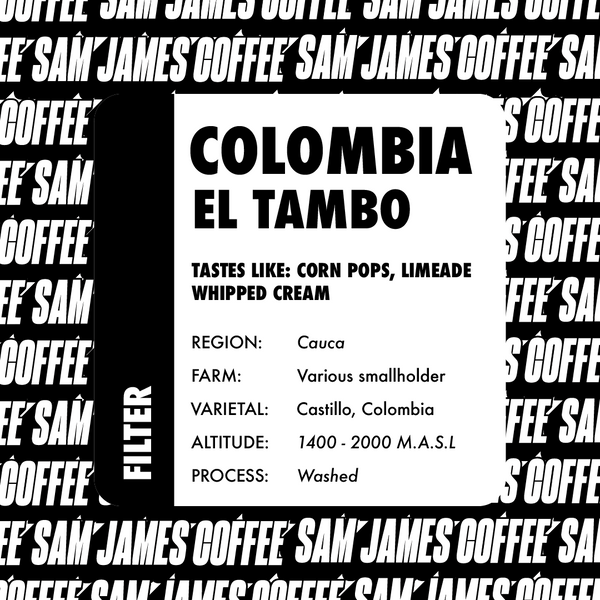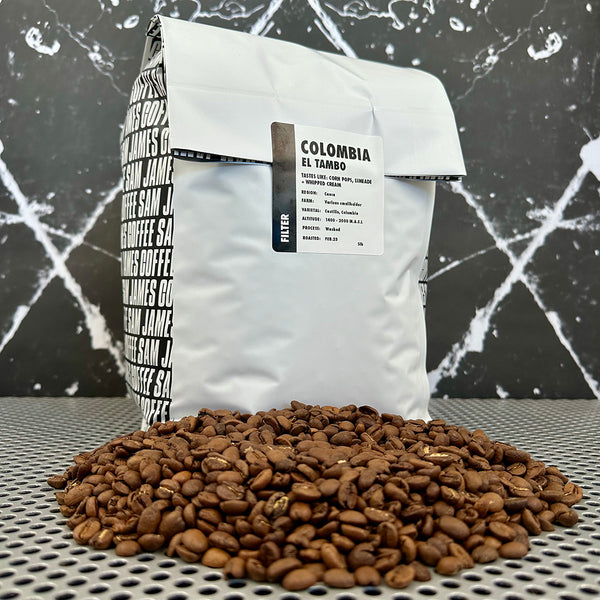Reviews (1)
Customer Reviews
COLOMBIA:
EL TAMBO
Tastes Like: CORN POPS, LIMEADE + WHIPPED CREAM
Medium Roast: 12oz / 340g BAG and 5LB option
Region: Cauca
Farm: Various Smallholder
Varietal: Castillo, Colombia
Altitude: 1400 -2000 m.a.s.l
Processing: Washed
ABOUT EL TAMBO
Program: Women Producers
To recognize and promote the work women do growing and producing coffee worldwide, the Women Coffee Producers project was established to highlight organizations and associations of women producers in various countries. The program aims to address the widespread wage inequity that women experience by adding a gender-equity premium on top of a base price; this premium is paid directly to the growers for use in any manner they choose. Association: Women ASMUCAFE
ASMUCAFE stands for Asociación de Mujeres Agropecuarias de Uribe, an organization of women farmers and landowners in El Tambo, a municipality within Cauca. The women's mission as an association is to improve their families' quality of life through coffee farming and to contribute positively to their community by working together and sharing resources, knowledge, and support.
The coffee, all of which is of Castillo or Colombia variety, is picked as purple (Castillo) or bright red (Colombia) cherry and undergoes a somewhat unusual “double" fermentation process, as the women describe it: First, the cherries are left in the loading hoppers for 14 hours, then they are de-pulped in the afternoons and evening hours and placed into traditional open fermentation tanks for another 10 hours. Then, they are washed three to four times before being dried in parabolic dryers or the sun for 8–12 days.
Region: Cauca
Cauca is in central-western Colombia, stretching from the Western Cordillera mountain range to the Pacific Ocean. Ocean winds and elevation result in Cauca being one of the most excellent regions of the country. The coffee in this area is grown mainly by indigenous or Afro-descendant communities.ABOUT THE PROCESS
Colombia is best-known for its Washed coffees. While the processing details might vary slightly from farm to farm or by association, generally the coffee is picked ripe and depulped the same day, then given an open-air fermentation in tanks or buckets for anywhere between 12–36 hours. The coffee is washed clean of its mucilage before being dried either on patios, in parabolic dryers, solar driers, or mechanically. Some Washed coffees in Colombia are mechanically demucilaged.
ABOUT COLOMBIAN COFFEE
Coffee came to Colombia in the late 1700s. The first plantings were in the north of the country. Coffee plants spread throughout the 19th century, with a smaller-than-average farm size more commonly found in other Latin American countries. Colombia still produces Arabica coffee exclusively. Our offerings come from the southwestern departments of Cauca and Huila, which have higher-altitude farms. This shines through in the more complex flavour and heightened chocolatey profiles.
Commercial production and export of coffee started in the first decade of the 1800s but remained somewhat limited until the 20th century. The establishment of the Federación Nacional de Cafeteros de Colombia was a tremendous boost to the national coffee industry. Colombia quickly established itself as a significant coffee-growing region, vying with Brazil for the top global producer. The Federación Nacional de Cafeteros de Colombia is a prominent NGO providing various services and support to coffee producers. Regardless of the size of their landholdings or production volume, the FNC helps out.
The FNC also guarantees a purchase price for any coffee grown in Colombia, providing farmers with financial security. This is designed to eliminate some market pressures and provide reliable income to the coffee sector. The scientific arm of the organization, Cenicafé, is devoted to research, development, dissemination, and support throughout the country. They provide A wide-ranging extension service employing more than 1,500 field workers. They are deployed to consult farmers on soil management, processing techniques, variety selection, disease prevention and treatment, and other agricultural aspects of coffee farming. A tax is imposed on all coffee exports to fund this work and the FNC's other provisions and protections.
Since our earliest days, our importer has had boots on the ground and spoons in the cup there. We fall in love repeatedly with the regional variations, varieties, landscape, and producers. Our work-sourcing of strong, versatile workhorse coffees will keep you coming back for more.
WANT A FUN WAY TO THINK ABOUT COFFEE AT HOME?
WATCH OUR FRIEND JOEY PLAY AROUND WITH THE 4:6 METHOD. LEARN MORE ABOUT THE 4:6 METHOD HERE.





